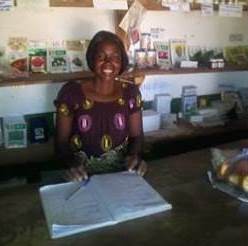
October 2015—In rural communities across Zambia, small-scale farmers have faced ongoing difficulty increasing their yields and turning a profit. The primary problem is that local farmers are unskilled in commercial farming practices.
However, through USAID’s PROFIT+ project, part of the U.S. Government’s global hunger and food security initiative, Feed the Future, farmers learn vital production and business skills that help them improve their farming techniques and better manage their commercial ventures.
In Petauke, located in Zambia's Eastern province, Nelia Banda, 51, a single mother of eight, found it difficult to manage her small farm. Despite adding fertilizer to her crops, her production didn’t increase. She was also unsuccessful in developing her small agro-dealer shop. Through her local farmers association, Banda was introduced to the PROFIT+ project’s “farming as a business” initiative in 2012, where she learned the skills necessary to increase crop production, including basic recordkeeping and pest and weed management.
“I didn’t understand how important it was to note the exact day of planting until I was taught that I could increase my yield through proper weeding and top dressing,” said Banda. “Because of the training, I learned that crop scheduling and recordkeeping were similar skills that I needed for both the farm and the shop. Not only did I learn easy methods for keeping records, I learned very simple methods for avoiding chuku (aflotoxin).”
Banda was so successful in applying her new skills that she was chosen by PROFIT+ to be a demonstration host farmer. Today, she teaches 106 farmers in her community about the new and improved farming methods. Her agro-dealer shop has grown, as she is able to provide more detailed guidance to her customers.
By incorporating basic recordkeeping, Banda is able to track her inventory and keep in-demand items in stock. These skills have also proven invaluable on her farm where she is recording her planting dates and production schedule in a similar way. The quality and quantity of Banda’s maize and groundnut production have improved, and she has also expanded her crop selection and is now growing sunflower and soya.
With the additional income, Banda is able to support her children and community. With two of her children now in university, she is looking forward to growing her farm and her business. Banda’s customers now come from as far away as Mozambique and she has become an agent for many agro-input suppliers. She also aggregates maize for big buyers.
There are 39 demonstration host farmers near Banda’s agro-input store, and these farmers help generate demand and increase her customer base for improved inputs and other technologies marketed by her business.
The PROFIT+ project builds on previous USAID-funded activities by linking agricultural supply with markets, promoting rural enterprises, and ensuring that women benefit from value chain development. The project increases productivity and expands markets for maize, oilseeds, groundnuts, soya and sunflower in Zambia's Eastern province. The project, which runs from June 2012 to June 2016, is designed to increase agricultural productivity and income by 30 percent, increase agricultural sales by $125 million, and benefit more than 800,000 Zambians.
LINKS
Follow @USAIDZambia, on Facebook, on Flickr, on YouTube







Comment
Make a general inquiry or suggest an improvement.